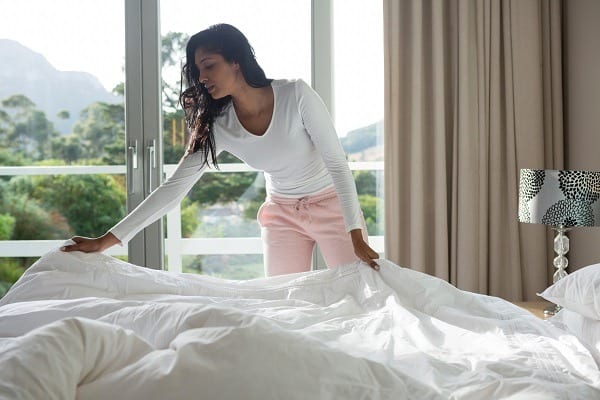Data from the HILDA survey of Australian households released last year, reveals that married women do, on average, twice as much housework and childcare as their husbands. And although since 2002 men have been doing one more hour of housework per week and women, one hour less, equality in the division of unpaid labour is still a long way off.
The clincher is that even when women are the breadwinners in a heterosexual relationship, they still do more unpaid household labour than their male partners. At the current rate, it will take 100 years to close this gender gap.
Associate Professor Leah Ruppanner is interviewed on the latest episode of the Women are the Business podcast by the University of Melbourne. This second podcast episode covers the nooks and crannies of unpaid work, both in the home and in the workplace, and its impact on women’s lives.
Associate Professor Ruppanner says one of the only ways we can change the uneven household labour dynamic is for women to go on a chore strike for a couple of weeks.
“I want you to let it all fall apart,” she says. And when you do this, two things are going to happen.
“One, everyone else is going to become acutely aware of all the work you’re doing that they were not aware of you doing. This includes that mental load that women are often doing in the household.”
“Two, it allows you to redistribute the roles, to actually sit down and have an accurate account of who’s doing what, how and when, and to divide it more equally.”
Once you have kids, the division of household labour becomes much clearer and we see women being more likely to drop out, reduce, start working from home, and up their own businesses.
In the podcast, Ruppanner also talks about how the value of unpaid work is still largely misunderstood.
“One of the things that’s missing in conceptualising unpaid work is the way in which unpaid work really supports paid labour,” she says. “So part of the reason why workers and children at home are able to show up and have an effective day, have lunches packed, clean clothes on, is in part because there’s all this unpaid work being done at home.”
And it’s not just in the home where women take on the most unpaid labour, it happens in the workplace too.
Research from the University of Melbourne reveals that chores also exist in the workplace (think taking notes in meetings, emptying the dishwasher, organising the staff Christmas party), and it’s largely women who carry the load.
Dr Maria Recalde is a lecturer in the Department of Economics at the University of Melbourne and is an Experimental and Behavioural Economist. Her research tells us that in workplaces, women are more likely to volunteer to do office chores.
In the podcast, Dr Recalde says this then leads to a vicious cycle where more women get asked to do chores, and more women are saying yes.
“There’s a lot of little things where you need one person to do a task. There’s no special skill required, and who ends up doing this types of tasks? It can be women,” she says.
The fact that women tend to do more chores in the office also means they have less opportunity to advance their careers. This might make it harder for women to get a promotion, which in turn makes it harder to earn more.
Throw in the effect of having a baby and we start to see how chores might contribute to the wage gap, or the reality that we have less women in leadership roles.
Dr Reclade believes that taking the burden off women in the workplace and asking men to do the chores, including those in positions of leadership, will be essential for creating change.
“If we get men to step up a little more…”
“Men to lean-in.”
“…To lean in to the types of tasks they would normally lean out.”
We’ll be featuring stories on all eight episodes of this podcast here on Women’s Agenda, thanks to our partnership with the Faculty of Business and Economics at The University of Melbourne.
Subscribe to the series on Spotify or Apple Podcasts.
Click here to see the full: #WomenAreTheBusiness series


